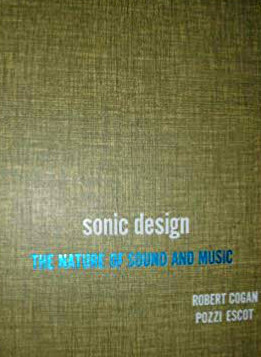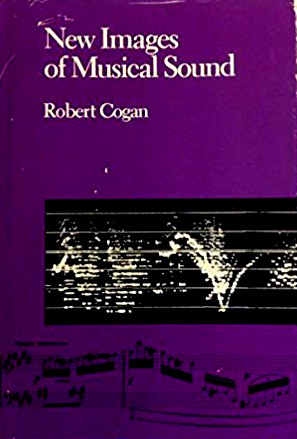MUT6636
Music Theory Seminar: Sonic Design
Syllabus - Spring 2020 (preliminary)
Selected topics from current research for study, presentation, and discussion.
Through the use of traditional and non-traditional means of musical analysis topics covered will include musical space, musical language, time and rhythm, color, gesture, form and structure. Focus will be on the concepts posited by Robert Cogan and Pozzi Escot. They see the journey as an "exploration of music creation and sonic resources, integrating theoretical perspective drawn from diverse periods and cultures into a new synthesis." We will consider music from des Prez through Carter and beyond.
Required Texts: | Cogan, Robert & Escot, Pozzi . Sonic Design: The Nature of Sound and Music. (Prentice-Hall, Inc., 1976). [amazon.com] |
Optional Texts:
 | Cogan, Robert & Escot, Pozzi . New Images of Musical Sound. (Prentice-Hall, Inc., 1976). [amazon.com] |
Materials Required:
- Blank Music Paper
(1) 16 GB Flash Drive (for backup)
- 20% Class Presentations (4 pts each, pass/fail)
20% Analysis Projects (4 pts each, letter grade)
20% Composition Projects (4 pts each, letter grade)
15% Listening Reports (5 pts each, pass/fail)
10% Independent Analysis Project #1
15% Term Analysis Project (Independent Analysis Project #2)
Office: Office 221/Lab 147/Studio 340/Lair 231
Office Phone No.: 273-3176
Office Hours: see schedule
Professor: Dr. James Paul Sain [email]
Policies:
1) All listening selections are from YouTube; please plan your time accordingly.
2) Late work is not accepted.
3) Attendance is required at all classes. Should a class be missed, it is the student's responsibility to see that the lecture notes from the missed class are obtained from a classmate and any work assigned is completed by their return. After three (3) class absences your grade will be lowered one grade increment for each absence after three (ie A to A-, or C to C-).
4) Plan early for your projects/compositions/research...things have a way of happening at the last minute.
5) The requirements, emphasis, and timing of this course may be changed or adjusted to meet the specific needs of the class as determined by the instructor.
6) All students of The University of Florida are expected to conduct themselves in a reasonable and professional manner at all times as described in the Student Honor Code; please refer to The Code for specifics.
7) UF Counseling Services - Resources are available on-campus for students having personal problems or lacking clear career and academic goals which interfere with their academic performance.
These resources include:
a. University Counseling Center, 301 Peabody Hall, 392-1575, personal and career counseling;
b. Student Mental Health, Student Health Care Center, 392-1171, personal counseling;
c. Sexual Assault Recovery Services (SARS), Student Health Care Center, 392-1161, sexual assault counseling;
d. Career Resource Center, Reitz Union, 392-1601, career development assistance and counseling;
e. University Police Department 352-392-1111 (or 9-1-1 for emergencies).
8) Students requesting classroom accommodation must first register with the Dean of Students Office in Peabody Hall. The Dean of Students Office will provide documentation to the student who must then provide this documentation to the Instructor when requesting accommodation.
a. Disability Resource Center 352-392-8565.
9) Students are expected to provide professional and respectful feedback on the quality of instruction in this course by completing course evaluations online via GatorEvals. Guidance on how to give feedback in a professional and respectful manner is available at gatorevals.aa.ufl.edu/students/. Students will be notified when the evaluation period opens, and can complete evaluations through the email they receive from GatorEvals, in their Canvas course menu under GatorEvals, or viaufl.bluera.com/ufl/. Summaries of course evaluation results are available to students atgatorevals.aa.ufl.edu/public-results/
10) My office door is always open; please feel free to drop by to discuss class issues as the need arises.
| A | 100-94% |
| A- | 93-90% |
| B+ | 89-87% |
| B | 86-83% |
| B- | 82-80% |
| C+ | 79-77% |
| C | 76-73% |
| C- | 72-70% |
| D+ | 69-67% |
| D | 66-63% |
| D- | 62-60% |
| E | 59-0% |
Week 1 (9 Jan)
- PRELUDE to a PRELUDE: what is this course and how will we achieve our goals
Intro to class; schedule presentations; Cogan-Escot text, Sonic Design
Week 2 (16 Jan)
- PRELUDE & MUSICAL SPACE (A)
- Prelude & Musical Space
 PDF of PPT presentation
PDF of PPT presentation
- Alexys & Connor
Week 3 (23 Jan)
- MUSICAL SPACE (B)
Analysis & Composition Assignment #1
Week 4 (30 Jan)
- MUSICAL LANGUAGES (A)
- Musical Language
 PDF of PPT presentation
PDF of PPT presentation
- Mia
Week 5 (6 Feb)
- MUSICAL LANGUAGES (B)
Analysis & Composition Assignments #2
Week 6 (13 Feb)
- TIME & RHYTHM (A)
- Time & Rhythm
 PDF of PPT presentation
PDF of PPT presentation
Xiao &Lanjiabao
Week 7 (20 Feb)
- TIME & RHYTHM (B)
Analysis & Composition Assignments #3
Week 8 (27 Feb)
- TIMBER: THE COLOR OF SOUND (A)
Dalton
Spring Break (Feb. 29 - Mar. 8)
Week 9 (12 Mar)
- TIMBER: THE COLOR OF SOUND (A)
Analysis & Composition Assignments #4
- AND - Review/Presentation in class of Independent Analysis #1 Projects
Week 10 (19 Mar)
- Guest Lecture: Dr. Rich Pellegrin (Cancelled due to pandemic)
Week 11 (26 Mar)
- No Class: Dr. Sain presenting two works on the Society of Composers Inc. National Conference, Univ Texas at Arlington
Week 12 (2 Mar)
- GESTURE, FORM & STRUCTURE (A)
Week 13 (9 Apr)
- GESTURE, FORM & STRUCTURE (B)
Analyais & Composition Assignments #5
Week 14 (16 Apr)
- Review/Presentation in class of Term Analysis Projects (Independent Analysis #2 Projects)
Week 15 (23 Apr, Thursday & Friday, Reading Days)
- No class - reading day
CLASS PRESENTATIONS Presentation of a unit, chapter or part of a chapter as signed-up during the first day of class. Where the presentation is shared, you can divide the materials as you'd like but ensure that the material is covered.
COMPOSITION PROJECTS Brief (8-16 measure) examples of the type of musical organization as was focused upon in the course unit. Write for yourself, class colleagues, or resources you can bring to class.
ANALYSIS PROJECTS An analysis of a composition utilizing techniques focused upon in the course unit. Make sure you give the significance of the discoveries through you analysis (what was determined utilizing said techniques that would not be using more traditional melodic and/or harmonic descriptors).
LISTENING REPORTS: A written critique of compositions on each listening list. These typed reports should contain objective prose describing the works on the listening list that demonstrates an understanding of the techniques used to produce the work as well as the aesthetic of the composition. Organize and articulate your thoughts given the studying you've done thus far in the text(s).
INDIVIDUAL ANALYSIS PROJECT Five (5) page report on an approved composition with additional figures (graphic analyses); an additional bibliography/discography must be included (not included in 5 page count for the body of the paper). See me for approval.
FINAL ANALYSIS PROJECT Ten (10) page report on an approved composition with additional figures (graphic analyses); an additional bibliography/discography must be included (not included in the 10 page count for the body of the paper). See me for approval.
- Listening List
- Supportive Course Materials
Haselböck, Luckas. (2019) Timbre and Form in Debussy's Nuages.
- Scores
Title, Author (year)
- Additional Resources
Liber Usualis (historic notation), Solesmes (1961)
Liber Usualis (modern notation), Solesmes (1924)
- last update 8 January 2020 -
